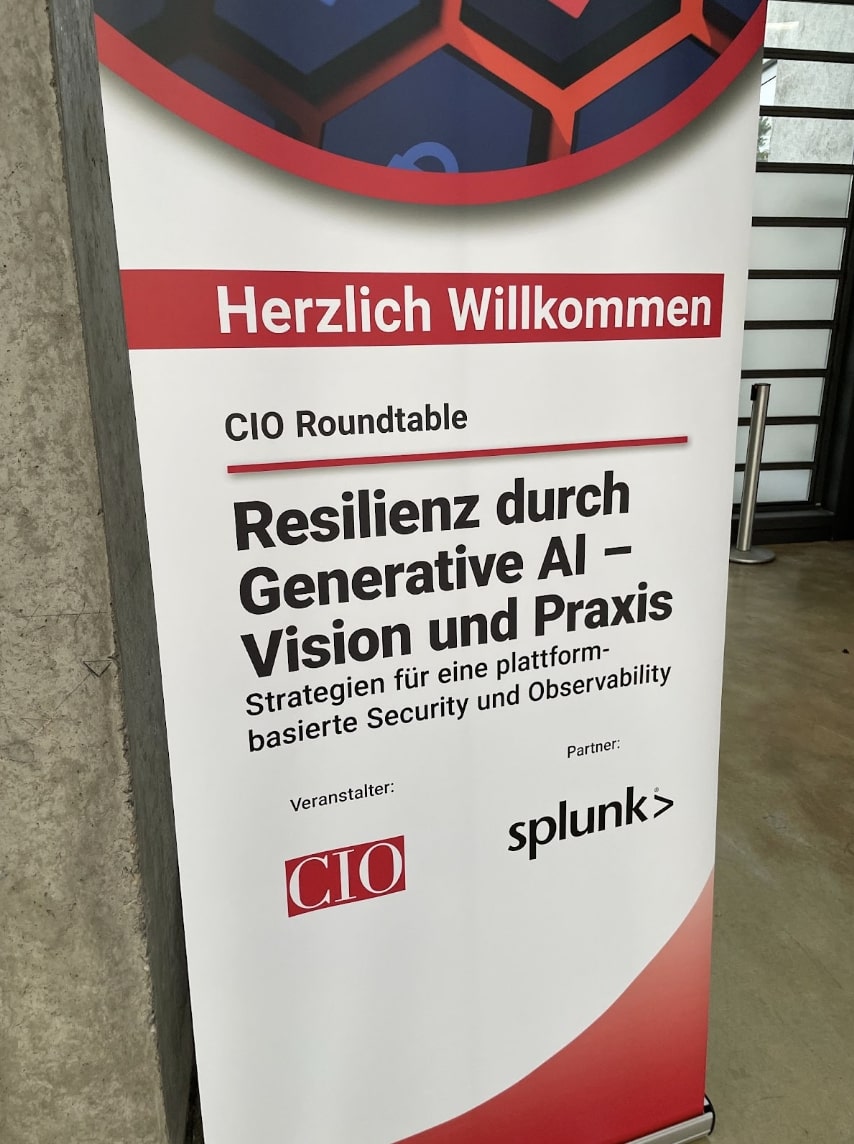CIO Roundtable: Harnessing GenAI for Resilient Security and Observability – Insights and Strategies

Hello Everyone,
I'm excited to share insights from a recent roundtable discussion we hosted in collaboration with CIO magazine. The talk focused on the dual challenge faced by IT and security managers: mitigating risks associated with AI while leveraging AI to enhance organizational capability. Given the ubiquitous media presence of AI, it was insightful to learn how German organizations are currently dealing with this technology.
 Echoes of the Past: From August Horch to Sam Altman
Echoes of the Past: From August Horch to Sam Altman
Where steam locomotives were once repaired, a Horch 855 Roadster had been placed. Inevitably bringing you back in time to August Horch, the challenges he faced in the early 20th century and comparing them with the obstacles Sam Altman of OpenAI had to overcome in the 21st century.
August Horch, left his first company, “Horch & Cie”, in 1909 due to disagreements with the board. He then established “August Horch Automobilwerke GmbH". Following a legal dispute over the name, his company was later renamed Audi, inspired by the Latin translation of the German word "horch" (= listen). This story is a great example of the challenges and changes facing today's technology business landscape.
Lightning Talks: Diverse Perspectives on AI's Impact
The roundtable began with insightful lightning talks hosted by CIO magazine’s Gerhard Holzwart. Florian Jörgens, CISO at Vorwerk, kicked off a thought-provoking discussion in which he questioned the idea that “attackers with AI have no advantage”. This sparked a lively debate, highlighting the need for shorter patching times, the sophistication of spear-phishing emails, and various countermeasures ranging from process improvements to security hygiene and employee awareness programs. The discussion also drew attention to the importance of further development in IT and security leadership, particularly in risk acceptance and management.
 I had the opportunity to share best practices in AI governance and policies observed across various organizations, including employee feedback mechanisms. I also discussed how Splunk and our customers are using AI to innovate in areas like cybersecurity, email analysis, predictive maintenance, and observability.
I had the opportunity to share best practices in AI governance and policies observed across various organizations, including employee feedback mechanisms. I also discussed how Splunk and our customers are using AI to innovate in areas like cybersecurity, email analysis, predictive maintenance, and observability.
Concerns and Opportunities Surrounding AI
Participants raised concerns about AI:
- potential misuse of GenAI by cyber attackers
- data privacy issues related to GDPR
- copyright implications of AI-generated content
- the possibility of erosion of workforce skills due to over-reliance on AI tools.
The discussions also highlighted the challenges of navigating the often conflicting claims of AI providers and the reality of legal contracts.
On the other hand, AI offers significant opportunities, including simplifying communication for diverse audiences, bridging workforce gaps, enhancing security detection and response capabilities, and fully automating production processes. One of the participants shared an example of a successful use case and talked about how he uses AI to detect road damage early, leading to substantial cost savings for a medium-sized city.
 Enterprise Strategies for Managing AI
Enterprise Strategies for Managing AI
About half of the participants are in the process of developing or have already implemented AI governance policies and associated committees. Some organizations even established dedicated AI functions or centers of excellence while others are operating private Large Language Models (LLMs) and exploring the quantifiable benefits of fine-tuning these models with organizational expertise. Additionally, there are practical approaches like implementing landing pages using ChatGPT to ensure acceptable usage policies are noticed, accepted and followed.
Thank you to all participants for their valuable insights. It was an enriching experience, and I am amazed to see German organizations actively tackling the complexities of this evolving technology.
Best,
Matthias
Related Articles
About Splunk
The world’s leading organizations rely on Splunk, a Cisco company, to continuously strengthen digital resilience with our unified security and observability platform, powered by industry-leading AI.
Our customers trust Splunk’s award-winning security and observability solutions to secure and improve the reliability of their complex digital environments, at any scale.




